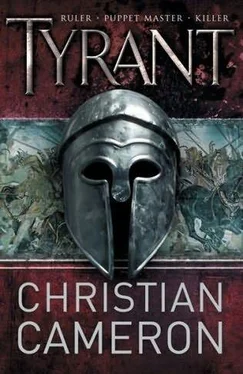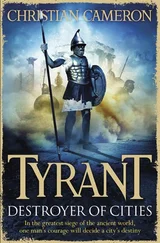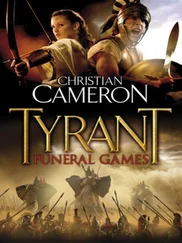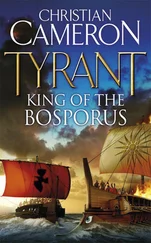Christian Cameron - Tyrant
Здесь есть возможность читать онлайн «Christian Cameron - Tyrant» весь текст электронной книги совершенно бесплатно (целиком полную версию без сокращений). В некоторых случаях можно слушать аудио, скачать через торрент в формате fb2 и присутствует краткое содержание. Жанр: Исторические приключения, на английском языке. Описание произведения, (предисловие) а так же отзывы посетителей доступны на портале библиотеки ЛибКат.
- Название:Tyrant
- Автор:
- Жанр:
- Год:неизвестен
- ISBN:нет данных
- Рейтинг книги:4 / 5. Голосов: 1
-
Избранное:Добавить в избранное
- Отзывы:
-
Ваша оценка:
- 80
- 1
- 2
- 3
- 4
- 5
Tyrant: краткое содержание, описание и аннотация
Предлагаем к чтению аннотацию, описание, краткое содержание или предисловие (зависит от того, что написал сам автор книги «Tyrant»). Если вы не нашли необходимую информацию о книге — напишите в комментариях, мы постараемся отыскать её.
Tyrant — читать онлайн бесплатно полную книгу (весь текст) целиком
Ниже представлен текст книги, разбитый по страницам. Система сохранения места последней прочитанной страницы, позволяет с удобством читать онлайн бесплатно книгу «Tyrant», без необходимости каждый раз заново искать на чём Вы остановились. Поставьте закладку, и сможете в любой момент перейти на страницу, на которой закончили чтение.
Интервал:
Закладка:
He learned about war — about how much pain his body could endure, about cold and heat, discomfort, desease, friendship and ambition and betrayal. At Guagemala he learned that he had a gift for seeing the battlefield as an organic whole, the way a physician might see a body, diagnosing its ills and proposing remedies. He read the Persians well enough to save his part of the front when the Persians pressed close and all seemed lost — and again he took a wound that put him down. A prostitute saved him from an ugly death on the battlefield, and he kept her for a while and then a while longer, and then they pursued the Great King to Ectabana, where barbarian traitors brought the Great King’s head to Alexander in a sack and the army knew that Asia was theirs and theirs alone.
Ectabana smelled of smoke and apples. The smoke came from the campfires, as the whole army of conquest concentrated there after the death of Darius. The apples were everywhere, brought for the pleasure of the Great King and taken as spoil by the first units that came up the passes. For the rest of his life, Kineas loved the smell of apples and fresh-pressed cider.
Kineas was one of the first, and because of it there were another hundred gold darics in his baggage, he had a fine sword with a gold handle and he lay on a couch, his leman’s breast under his hand, drinking cider from a silver cup like a gentleman instead of standing by a campfire drinking it from clay or horn like ten thousand other Hellenes. His woman wore a perfume that had come out of the palace, a scent that caught in his throat like the woodsmoke.
He was happy. They all were. They had beaten the greatest empire in the world, and nothing could ever stop them. Kineas never forgot the feeling of that night, the smell of smoke and apples and her perfume, like a tangible Nike lying in his arms. And then his boyhood friend Diodorus, who had ridden with him from Issus to Ectabana, an Athenian gentleman with a mind like a fox and red hair to match it, came in from his stint on guard duty, drank his cider and said they were going home.
‘The war of the Hellenes is at its end,’ Alexander said. He sat on an ivory chair and wore a diadem.
Kineas loved to follow Alexander, but the chair and the diadem made him look like a stage tyrant. He stood impassively with the other allied officers. If Alexander meant to impress them, his words fell flat.
‘You have served the League brilliantly. There is a reward here for every one of you. If any of your men choose to stay, they will be enrolled with the mercenaries.’ Alexander raised his eyes from the sacks of coins on the ground by his chair. He had heavy circles under his eyes from drinking, but the spark was still there, dancing away, as if something inside his head was on fire.
Kineas wondered for an instant if there had been a mistake in phrasing — if he, too, would be welcome to remain and conquer the rest of the world. And then Alexander’s eyes met his and he read his dismissal. The officers were to go home. Alexander spoke on, ringing phrases of praise rendered empty by the bags of gold at his feet. I’m done with you. Go. He lingered by the door of the king’s tent when the other allied officers filed out, hoping for a kind word, an exception, but Alexander rose without another glance and left by another door.
So.
Kineas wondered if Alexander knew how much political poison smouldered among his precious Macedonians, but he clutched his thoughts close. He kept his own counsel when his leman left him for a Macedonian cavalry officer — one of many Phillips — rather than travel home with him, and he was laconic when a deputation of his men came to him and asked him to remain and command them. Some suggested that they remain together and take service with Alexander’s regent in Macedon, Antipater.
Kineas had no interest in serving Antipater. In a day he had realized that he had loved Alexander, not Macedon. He packed up his darics and his wreaths, sold most of his booty, retained some fine cups for friends in Athens and a wall hanging for his mother. He kept the sword, and the heavy grey horse, and his stained cavalry cloak, and prepared to be a rich farmer. He had been away for six years. He would return a wealthy man, take a wife.
The Athenians went with him. Kleisthenes and Demetrios were rotting in the ground, or walking in the groves of Elysium, but Laertes and Agis and Gracus and Diodorus had survived battle and disease and misery and hardship. And Niceas. Nothing could kill Niceas. They rode towards home together, and no bandit dared ambush their convoy. When they reached Amphilopolis on the Greek mainland, none of the other young men were ready to press on. They lingered in the wineshops. Kineas hurried home.
He found that he needn’t have hurried.
In Attica, he found that his father was dead, and that he himself had been exiled for serving Alexander. He fled north, to Platea, where there was a community of Athenian exiles.
He’d only been there a day when he was approached by an Athenian with a proposition. Of course, the man came from the same faction that had arranged his exile. But Kineas had grown up with Athenian politics, so he smiled, and negotiated, and that night he sent Diodorus a letter, and another to a friend of his father’s, another exile, on the Euxine.
PART I
‘Therein fashioned he also two cities of mortal men exceeding fair. In the one there were marriages and feastings, and by the light of the blazing torches they were leading the brides from their bowers through the city, and loud rose the bridal song. And young men were whirling in the dance, and in their midst flutes and lyres sounded continually… But around the other city lay in leaguer two hosts of warriors gleaming in armour. And twofold plans found favour with them, either to lay waste the town or to divide in portions twain all the substance that the lovely city contained within.’
Iliad, Book 181
The same squall that broached the pentekonter, knocking her flat against the waves and filling her sail with water, swamped the smaller trading ship to the south. The smaller trader’s cargo shifted and she sank, the screams of her crew carried clear on the wind. The pentekonter lay broached, the standing sail a testimony to the inexperience of her trierarch and the unshifting cargo a tribute to her sailing master’s skill. The ship should have gone down anyway, lost on the Euxine with all hands, except that the sailing master hurled himself over the side at the mast, taking a bronze knife from a sheath around his neck and sawing at the lashings that held the sail to the yard.
Under the awning in the stern, the trierarch lay in horrified paralysis against the stem, unable to cope with the consequence of his disastrous decision to leave the mast stepped. The chaos on the rowing benches was as immediate a crisis as the sodden sail — the trierarch had ordered the rowers to set the sweeps just before the squall hit, vainly trying to use the oars to keep her head before the wind, and when the ship broached the wind-driven water had forced the long wooden shafts back in through the tholes, ripping them from the rowers’ hands and crushing heads and rib-cages. Two men were dead, one of them the oar master.
The ship’s only passenger, a gentleman from Athens, had also lost his feet when the ship tipped, but not his head. He threw himself up, grabbing at the other side of the ship as it curved away from the stem above him, getting his feet under him. A glance showed him that the cargo had not shifted, another that the oarsmen were panicking.
‘Hard in, there,’ he bellowed. ‘Oarsmen! Larboard side!’ His voice carried over the wind of the dying squall with ease; the habit of command and the expectation of obedience as strong as the sound itself. Every man in the waist who had any command of himself obeyed, men scrambling over each other in the rising water to grasp the side that was still out of the water.
Читать дальшеИнтервал:
Закладка:
Похожие книги на «Tyrant»
Представляем Вашему вниманию похожие книги на «Tyrant» списком для выбора. Мы отобрали схожую по названию и смыслу литературу в надежде предоставить читателям больше вариантов отыскать новые, интересные, ещё непрочитанные произведения.
Обсуждение, отзывы о книге «Tyrant» и просто собственные мнения читателей. Оставьте ваши комментарии, напишите, что Вы думаете о произведении, его смысле или главных героях. Укажите что конкретно понравилось, а что нет, и почему Вы так считаете.












